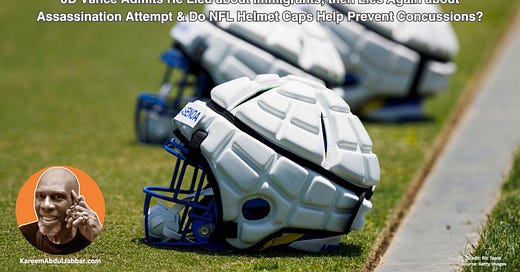JD Vance Admits He Lied about Immigrants, then Lies Again about Assassination Attempt & Do NFL Helmet Caps Help Prevent Concussions?
What I’m Discussing Today:
Kareem’s Daily Quote: Can you go a day without rationalizing? Would you even know if you were rationalizing?
Vance Sticks By Pet-Eating Claims and Says He’s Willing to ‘Create Stories’: In a stunning interview, Vance admits he knew the pet-eating story was a lie. There has to be a prosecutable crime in that.
Bomb Threats Disrupt Springfield, Ohio Amid False Right-Wing Claims: They know it’s a lie. They know they’re putting children’s lives at risk. They still do it.
Florida school district must restore books with LGBTQ+ content under settlement: The books are back, baby! It feels so good when justice prevails.
Kareem’s Video Break: This act of sportsmanship is what sports are all about.
Can N.F.L. helmet caps actually help?: Billions of dollars are at stake. What do you think?
“Hopeful skepticism”: The cure for cynicism and how to apply it: Turns out, cynicism is bad for the health—and the community.
Nilsson Sings “Everybody’s Talkin’”: A great song from a great movie.
Kareem’s Daily Quote
I don't know anyone who could get through the day without two or three juicy rationalizations. They're more important than sex.
Michael (Jeff Goldblum) in The Big Chill (1983)
When Jeff Goldblum delivers his worldly observation to the group of thirty-something friends in The Big Chill, his friend Sam scoffs: “Ah, come on. Nothing's more important than sex.” To which Goldblum replies with a grin: “Oh yeah? Ever gone a week without a rationalization?” That’s pretty good logic. It was probably the first time I thought of rationalization in that context and it immediately felt like a solid truth.
One dictionary definition of rationalize is the “attempt to explain or justify (one's own or another's behavior or attitude) with logical, plausible reasons, even if these are not true or appropriate.” People generally can’t survive without rationalizing their actions or the actions of others close to them. An abusive parent rationalizes with, “That’s how my parents raised me and I turned out okay.” A person dating someone who treats them disrespectfully—as everyone else can see—justifies their behavior with, “You don’t know the real them.” And so forth.
We rationalize our actions whenever those actions fall short of the person we want to be. We can’t stand living knowing that we aren’t close to being that person and probably never will be. “All politicians are the same so I don’t get involved,” is a rationalization to not take responsibility for the course of the country. Declaring extra made-up items to the insurance company after a burglary is excused with, “Big insurance is always ripping people off so they won’t miss it.” So, rationalizing overgrows like a wild vine until all that’s left is the illusion that we’re a “good person.” And that illusion becomes our reality.
Many rationalizations are harmless moral glitches made with good intentions. But the more we do it, the easier it becomes until it’s difficult to tell the difference between harmless and harmful. Between kindness and delusion.
We need to rank our daily justifications the way we do DEFCON (defense readiness condition) if we have any hope of being truthful with ourselves. DEFCON 5 is telling a friend the pimple on their nose is hardly noticeable. DEFCON 2 is telling yourself that the person you’re cheating or cheating on brought it upon themselves. DEFCON 1 is finding an excuse to rape, molest a child, or murder someone (“I couldn’t help myself.”).
The challenge is to be brutally honest with yourself while you can still recognize the person you want to be. Otherwise, you’re just staring at a flattering reflection of yourself in the mirror, while your personal Dorian Gray painting withers in the attic.





